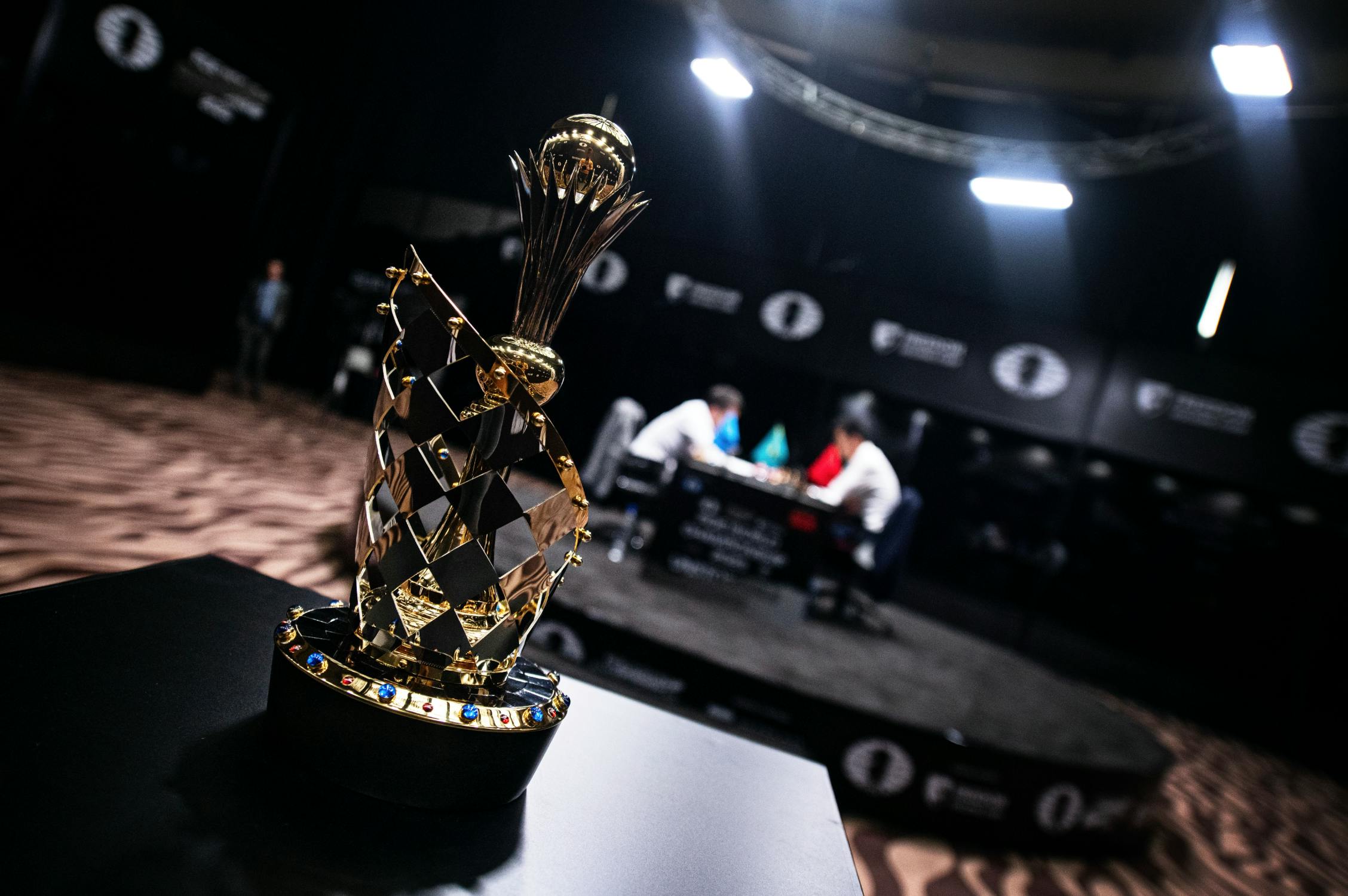World Chess Championship: Games 5 and 6 - A Slugfest
A recap of Games 5 and 6 of the World Championship between Nepomniachtchi and Ding by the Lichess team and with annotations by GM Harikrishna Pentala

Games 5 and 6 of the 14-game match between Ian Nepomniachtchi and Ding Liren have just been played in Astana, the capital of Kazakhstan. The winner will be crowned as the new World Champion in classical chess, following Magnus Carlsen’s abdication of the title.
The schedule of games can be found here, with Lichess providing a live broadcast transmission of all games. Read below for detailed thoughts and annotations on the games from GM Harikrishna Pentala – one of the strongest players in the world (FIDE Rating: 2704, World Rank: 34) and a former world top 10 player with a peak rating of 2770, along with more general impressions on the tournament so far.
Game 5
The annotations by GM Harikrishna Pentala are provided in the embed below, with a direct link to the full study available here.
https://lichess.org/study/SkQqKSso/5kPuntXV
Coming into Game 5, the big question was how Nepomniachtchi would play after the loss to Ding Liren in Game 4. Despite having the rest day to recover, Nepomniachtchi has in the past struggled to overcome a loss.
Much like in Game 1, the players opted for a closed Ruy Lopez, highlighting the days of the Berlin Defence meta might (hopefully) be behind us – at least for this match. Nepomniachtchi appeared to be incredibly well prepared, blitzing out 20 opening moves using just three minutes from his clock. Ding, psychologically and from the time perspective, was on the back foot.
Regardless, Ding played the first 25 moves or so perfectly – as did Nepomniachtchi. The tiniest positional passivity from Ding was seized upon by Nepomniachtchi, who just needed that slightest finger-hold to begin prising open the position with the aggression he is known for. With Ding having no real options for counter-play, the ball was very much in Nepomniachtchi’s court, as he rolled his kingside pawns down for a crushing attack.

(Photo - FIDE / Stev Bonhage)
Meanwhile, Nepomniachtchi circled Ding like a hawk on the playing stage in between moves, keeping his eyes fixed not on the board but on Ding himself. Far from being tilted by the Game 4 loss, Nepomniachtchi seemed to be fired up, more motivated and hungry for a win than ever. After 48 moves, Ding resigned – with this game certainly being one of the best and most precise from Nepomniachtchi who seemed to conjure up a win from almost nothing.
The win, aside from being a major psychological victory for Nepomniachtchi, also put him back into the lead with a score of 3 - 2.
Game 6
The annotations by GM Harikrishna Pentala are provided in the embed below, with a direct link to the full study available here.
https://lichess.org/study/SkQqKSso/JYZ4SXRf
Following his earlier psychological fragility, the question was on how Ding would cope with his loss in Game 5 – which Ding had described as a harder loss for him than in Game 2. Surprisingly, Ding opened with 1. d4 and went into the London System – again, perhaps with the fingerprints of his second somewhat visible (Rapport has a line in the London System co-named after him; the Rapport-Jobava line).
Depending on who you ask, the London System is either viewed as dry and unambitious for white, or as a potent weapon whose potential is not fully understood by a community of Luddites. Regardless, it is not often an opening (sorry, “system”), that is often seen at the elite level – in fact, this is the first ever classical World Championship game in history where the London was played.
As a system, extensive opening theory isn’t required – but Ding perhaps took this to extremes, claiming in his post-match interview to be out of preparation by move 6 (it is not uncommon at such a level for players to have memorized entire lines to move 30 or beyond). With the honesty Ding has shown in the post-game interviews so far, it seems unlikely he would be deceptive about this.
Yet the solid, relatively quiet, position did appear to frustrate Nepomniachtchi, who perhaps out of impatience was discontent with such a passive position. Nepomniachtchi’s preference for aggressive and dynamic chess was perhaps used against him masterfully by Ding, giving Nepomniachtchi a double-edged opportunity to bring the game to life, at the cost of his own positional stability.

(Photo - FIDE / Anna Shtourman)
While by no means clearly winning for Ding, he continued building on his advantage until it was clear that the momentum of the position was with him, and having a greater pool of viable candidate moves that at least maintained his edge. By move 42, Ding had a mate in 18 moves, and a few moves later Nepomniachtchi resigned – a brutal blow to Nepomniachtchi as Ding came out swinging, making the score a level 3 – 3.
Snap verdict
What an exciting mini-match! This has become one of the most decisive World Championships in history, matching the same ratio of wins to draws by Game 6 as Karpov – Korchnoi in 1981, and Steinitz – Gunsberg in 1891. In just 6 games, both players have the same number of losses (two), as Carlsen received over a decade of playing World Championship games!
Nerves and pressure have clearly affected both players significantly. Many elite-level commentators, such as Caruana and Giri, have remarked that they don’t believe the play has been reflective of their true level. But beyond that, it seems that the particular preferred playing style of both players are anathema to each-other. Nepomniachtchi gets frustrated by Ding’s preference for slow, positional grinds; Ding gets overwhelmed by the ferocity of Nepomniachtchi’s attack. At this level, that shouldn’t mean much – but the smallest imbalances are exploited by both players.
To the surprise of Caruana and Giri, Ding does genuinely seem to have come into this match underprepared. Yet, despite Nepomniachtchi’s deeper prep, and with a team with World Championship experience, allegedly including Kramnik, Leko, Vitiugov, and Potkin – Ding is still holding his own.
The Game 6 loss will not be easy for Nepomniachtchi, but he again has another rest day to reset and recover. How will Game 7 go? At this point it’s essentially a coin toss! But this author still gives it perhaps 53 – 47 in Ding’s favor. The clearest winner? Proponents of the London System, who can now boast it has a 100% win rate in World Championship games.
Lichess is regularly running World Championship Thematic Arenas on the days of the tournament - with positions taken from the games. Make sure you follow our social media to see when the next one will be!
(Tile photo - FIDE / Stev Bonhage)